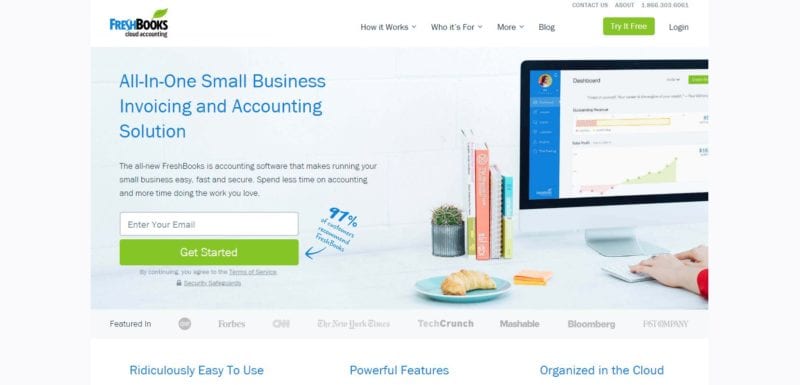As a small business owner, you wear a lot of hats in your company. And while accounting and bookkeeping probably aren’t your favorite parts of the business (unless you’re an accountant, that is), they’re still necessary to run a legal and successful business.
There are a lot of factors to consider when it comes to choosing the right cloud accounting software for your business. Are you a freelancer? A sole proprietor? Or are you running a mid-sized business?
You know your small business, and your accounting needs better than anyone.
In this post, we’ll be comparing two of the most popular full-service accounting services for small businesses, Xero and FreshBooks so that you can choose the right accounting app for your business. We’ll compare the two accounting software based on the following features:
- Who It’s Best For
- Ease of Use
- Pricing
- Accounting Features
- Integrations
- Customer Support
- User Reviews
Hopefully, you'll be able to use this guide to find the perfect cloud accounting software for your small business.

Who It's Best For
It would be difficult to definitively claim one of these services to be better than the other, as both shine in different areas. Based on the websites and reviews of each service, it’s clear they’re catering to a diverse customer base.
Xero

Xero is best for small to mid-sized businesses who need a more robust all-in-one accounting software. Xero has the basic accounting features you’ll find with any online accounting software. But it also has more advanced functions such as project management, payroll, inventory management, etc.
FreshBooks

FreshBooks is best for freelancers or very small businesses who are regularly working with and invoicing clients. The invoicing tool is the bread and butter of FreshBooks, and though they have more features than that, that is still the primary need of their customer base.
FreshBooks gives freelancers and small business owners to get exactly the features they need without paying for additional features that will go unused.
I think the popularity of FreshBooks definitely shows us that more isn’t always better in the eyes of business owners. Business owners are willing to pay a comparable price (or even more) for fewer features that are simpler and more straight-forward.
P.S. Are you considering becoming a freelance or starting your own online business? Make sure to check out these resources:
Ease of Use

Xero
Xero is far more complicated of software as far as what it can accomplish for small business owners. It’s geared towards businesses who have more significant accounting and payroll needs.
Because of this, it has a steep learning curve, and getting your account set up will likely take a bit of a time investment. However, they do have a setup wizard that helps you get your account set up.
Additionally, Xero has a process in place for converting customers from QuickBooks Online to Xero. So if you’re currently using QuickBooks, setting up your Xero account won’t take as long.
FreshBooks
FreshBooks is designed to be a simple software for small business owners with relatively simple accounting needs, so it should come as no surprise that it’s very user-friendly.
The set-up process is straightforward, and you can have your account up and running in just a few minutes.

Pricing
Xero
Pricing for Xero starts at just $9 per month for their Early plan. If this sounds too good to be true, it probably is. The $9 for this plan covers just five invoices and quotes, five bills, and 20 bank transactions.
This plan is most likely to be used for businesses who are just getting on their feet and who will shortly need to upgrade to the next plan.
Xero’s mid-priced plan, their Growing plan, comes in at $30 per month. This plan offers the same features as the Early plan: invoice and quotes, billing, and bank transactions. The big difference with this plan is that all of those features are unlimited.
Finally, Xero has their Established plan, which costs $60 per month. In addition to the features in the Early and Growing plans, this plan allows you to do business in multiple currencies, manage your expenses, and track project time and costs.
Each of these plans offers the option of a 30-day free trial.
Additionally, you can add Gusto full-service payroll to any of these plans. Pricing for payroll starts at $39 per month plus $6 per month per person.

FreshBooks
Pricing for FreshBooks starts at $15 per month for their Lite plan. This plan allows for up to five clients and allows you to send invoices and estimates, track time and expenses, accept credit card payments, and integrate with your bank to track income and expenses.
Their Plus plan, which they tout as the most popular, costs $25 per month. This plan includes all of the features of the Lite plan, with a handful of others. These additional features include sending payment reminders, charging late fees, and double-entry accounting, among other things. You this plan allows for up to 50 clients.
The Plus plan also includes the ability to collaborate with your accountant or bookkeeper easily.
Finally, FreshBooks has their Premium plan, which allows for up to 500 clients and will cost you $50 per month. Other than the ability to add up to 500 clients, this plan includes the same features as the Plus plan.
With each of the three plans, you’ll receive a small discount by paying annually instead of monthly. Additionally, you can try each of those plans for free for 30 days.
In addition to the three plans listed on their website, FreshBooks also offers a FreshBooks Select plan for businesses with more than 500 or more than $150k per year in revenue, but the price is not listed on their website.

Accounting Features
When it comes to choosing a cloud accounting software for your business, the accounting features are really what is likely to make or break your decision. Though there’s certainly some overlap, both Xero and FreshBooks seem to excel in different areas.
Xero
Let’s start with the most basic feature: bank integration. You can connect your bank or credit card accounts to Xero to automatically track cash flow. Additionally, you can manually record expenses and receipts.
The invoicing feature with Xero very extensive and customizable. There are a lot of options as far as design, whether you’re using a template or using a fully customized design.
Xero has more options with their invoicing system than FreshBooks does, largely because Xero is meant for businesses who may have inventory to track or a more extensive invoicing process, such as going through a billing department.
Xero has a reporting dashboard you can customize to show only what you specifically want to see. Depending on the business this might include outstanding invoices owed to you, outstanding expenses, profit, debt ratio, and many more.
In addition to the basic accounting features, Xero also includes some other powerful features that set it apart from its competitors.

One of those features is their project management feature. Xero has two options for project management. Their built-in project management allows you to track time and costs on projects.
They also have a more advanced project management tool that costs extra, but that keeps track of far more factors.
Xero also has a robust inventory management feature that allows you to track inventory, manage stock, and add items to invoices and orders.
Another feature that sets Xero apart is payroll. Xero partners with Gusto to provide full-service payroll for businesses in all 50 states. The two software sync so you can navigate both platforms with just one sign-in.
Their full-service payroll covers everything from federal and local taxes to W-2s and 1099s.
This doesn’t cover every single service offered by Xero, but it covers the major features you’ll probably be looking for as a business owner.

FreshBooks
Again, perhaps the most basic tool of any accounting software is integration with bank and credit accounts to track income and expenses, and FreshBooks is no exception.
In addition to having expenses information automatically pulled from your integrated accounts, you can also manually add your expenses. Like the other features of FreshBooks, this is intuitive and easy to do.
When it comes to accounting services, FreshBooks excels with their invoicing and payments tool. As they are a company who caters to freelancers and small business owners who are working with clients, this tool is their primary feature. Just a glance at their invoicing tool and you can figure out how it works.
FreshBooks also has a time tracking tool. This allows you to track how much time you’re spending on each client or project. When you’re done, you can generate an invoice from that time entry. For business owners who are working with clients and billing hourly, this will be an incredibly useful tool.
Finally, let’s talk about the FreshBooks reporting feature. Like the rest of the software, it’s pretty simple. Remember, FreshBooks is catering to customers who want simple. Your dashboard immediately shows you graphs for outstanding revenue, total profit, revenue streams, spending, and unbilled time.
In addition to the information available on the front page, there are a number of reports you can download. Those reports include a profit and loss statement, invoice details report, sales tax summary report, reports filtered by the client or team member, as well as quite a few more.

Integrations
Xero
When it comes to integrations, Xero is really in a league of its own. On their website, Xero lists integrations with over 700 other apps.
They have the apps listed on their website and organized by function. Functions include inventory, payments, CRM, eCommerce, point of sale, and many more.
FreshBooks
FreshBooks has far fewer options for integrations. There are a total of 80 on their website. Their integrations cover services such as marketing, time tracking, CRM, payroll, and eCommerce.

Customer Support
Xero
Xero 24/7 customer support that is free and unlimited to those with a Xero login and password. They’ll start by directing you to their support articles, and give you the option to speak to a customer support team member if you need additional help.
FreshBooks
FreshBooks boosts award-winning customer support. Their F.A.Q. Page can help you answer the basic questions. Additionally, you can talk to a real human via telephone or email during their office hours, which are Monday-Friday, 8am-8pm EDT.
User Reviews
To compare user reviews of Xero and FreshBooks, we took a look at a number of sites, specifically those geared toward helping small business owners find software and services for their business.
Xero
Overall Xero has excellent reviews, ranging from a rating of 4 out of 5 to a full 5 out of 5. Negative reviews pinpointed the price and steep learning curve of Xero. Meanwhile, positive reviews appreciated how powerful and thorough the program is.
Reviews for Xero’s mobile apps aren’t great, and reviewers complain about lack of functionality. Xero has a rating of 2.5 out of 5 in the iOS app store and a rating of 3.5 out of 5 in the Android app store.

FreshBooks
Like its competitor, FreshBooks also has overwhelmingly positive reviews.
Fans of the service specifically praise the ease of using the site and simplicity of the services. Additionally, fans of the service specifically state FreshBooks to be ideal for sole proprietors, freelancers, and creatives.
The most common complaints of FreshBooks seem to be price and the fact that some of the features may be too limited.
Overall the reviews range from a 4 out of 5 to a 4.8 out of 5.
For the mobile apps, FreshBooks has good reviews in both the iOS and Android app stores. The app has a rating of 4.8 out of 5 in the iOS app store and a 4.2 out of 5 in the Android app store.
Alternatives
While Xero and FreshBooks are leaders in cloud accounting services for small businesses, it’s worth noting a couple of alternatives. Depending on what features you need, it may be worth cutting costs for a less robust service that still provides everything you need.
QuickBooks

QuickBooks is a name you’ve probably heard before. The software is owned by Intuit, the company that also owns Mint and TurboTax.
QuickBooks offers several options for small business owners to take care of their accounting and invoicing needs. They have five pricing plans that run from $10-$150, though you can frequently find them on sale, especially around tax season.
The most basic plan available is their Self-Employed plan, which is specifically geared towards freelancers and sole proprietorships. The plan offers basic accounting features such as:
- Integrations with your bank and credit card account for income and expense tracking
- The ability to upload and organize receipts
- Quarterly tax estimations
- Invoicing software and the ability to accept payments
- Basic reporting
- Mileage tracking

From there the features get more advanced as you move to the more expensive plans. The features available are everything you would expect from a small-business accounting solution.
Those features include bill management, time tracking, inventory management, management of 1099 contractors, and payroll (billed based on the number of employees).
Finally, their most expensive plan, QuickBooks Advanced, allows for additional users and more robust customer service with a dedicated customer success manager.
Another thing worth noting is that when you file your taxes with TurboTax Self-Employed, you get a free year of QuickBooks Self-Employed. If you’re a freelancer looking for more straightforward accounting software, this would be an ideal opportunity to take advantage of.
As far as services offered, QuickBooks offers more extensive features than FreshBooks. However, it is not quite as robust as Xero.
Wave

Wave sets itself apart by being the only software on the list to offer a truly free plan.
Under the free plan, you have access to accounting, invoicing, and receipts features.
The accounting feature allows you to connect to an unlimited number of banks and credit card accounts to track your income and expenses.
The invoicing feature allows you to send personalized invoices in any currency.
Finally, the receipts feature allows you to scan receipts using the free Wave iOS and Android mobile apps to be logged as transactions.
Another thing that makes Wave unique from its competitors is that rather than having a set cost for each plan, some of their features are pay-per-use. For example, you’ll pay 2.9% + $.30 per transaction for credit card payments you accept, or 1% per bank payment.

Finally, Wave offers payroll services. Depending on what state you’re in, you’ll either pay a $35 monthly base fee plus $4 per employee, or a $20 monthly base fee plus $4 per employee.
If you only need accounting software to track your income and expenses, then Wave is a great option for you and will allow you to save some money every month.
If you’ll be using any of the other features, you may want to use one of the alternatives for a more robust product and better user experience. Wave undoubtedly offers the least amount of features of any software on the list.
Conclusion

As you can see, there are many options when it comes to online accounting services, making it easy to find the one that is just right for you.
Ultimately, it seems that the two services cater to different types of business owners.
Whether you’re a sole proprietor or a mid-sized business, one of the services in this article is sure to help you meet your online accounting needs and get your business running more smoothly.
If you haven't yet, make sure to check out Xero and FreshBooks so you can decide which is right for your small business.


